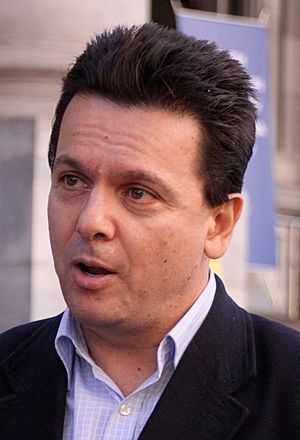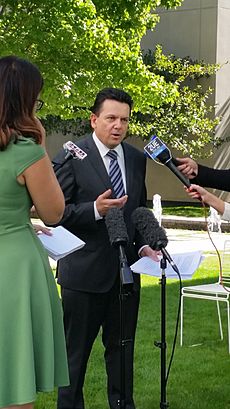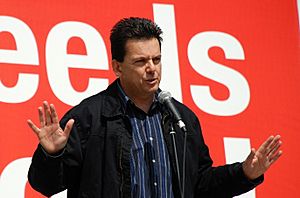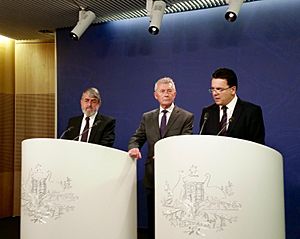Nick Xenophon facts for kids
Quick facts for kids
Nick Xenophon
|
|
|---|---|

Xenophon in 2009
|
|
| Senator for South Australia | |
| In office 1 July 2008 – 31 October 2017 |
|
| Succeeded by | Rex Patrick |
| Member of the South Australian Legislative Council |
|
| In office 11 October 1997 – 15 October 2007 |
|
| Leader of Independent No Pokies Campaign Group | |
| In office 13 September 1997 – 1 July 2013 as No Pokies |
|
| Deputy | Ann Bressington |
| Preceded by | Party established |
| Succeeded by | John Darley |
| In office as 1 July 2013 – 5 March 2017 as Nick Xenophon Team |
|
| Deputy | Stirling Griff |
| Preceded by | Party merged |
| Succeeded by | Party dissolved |
| In office 4 July 2017 – 17 March 2018 as SA-BEST |
|
| Deputy | Kris Hanna |
| Preceded by | Party rebranded |
| Succeeded by | Frank Pangallo |
| 1st Leader of Centre Alliance Party | |
| Assumed office 24 March 2022 |
|
| Deputy | Kris Hanna |
| Preceded by | Connie Bonaros |
| In office 10 April 2018 – 7 May 2018 |
|
| Deputy | Skye Kakoschke-Moore |
| Preceded by | Rebekha Sharkie |
| Succeeded by | Party established |
| Personal details | |
| Born |
Nicholas Xenophou
29 January 1959 Adelaide, South Australia, Australia |
| Citizenship | Australian British Overseas (renounced) Greek (renounced) |
| Political party | Independent (1997–2022) |
| Other political affiliations |
Liberal (1976–1981) No Pokies (1997–2013) Nick Xenophon Team (2013–2018) SA-Best (2017–2018) |
| Spouses |
Sandra Kazubiernis
(m. 1990; div. 2007) |
| Children | 2 |
| Education | Prince Alfred College |
| Alma mater | University of Adelaide (LLB) |
| Occupation | Law firm principal (Xenophon & Co. Lawyers) |
| Profession | Solicitor Politician |
Nick Xenophon (born Nicholas Xenophou on 29 January 1959) is an Australian lawyer and former politician. He was a Senator for South Australia from 2008 to 2017. As an independent politician, he did not belong to a major political party. This made his vote very important in the Australian Senate.
Xenophon was one of Australia's most successful independent politicians. He even started his own political party, the Nick Xenophon Team. He resigned from the Senate in 2017 to run for a seat in the South Australian parliament. From 1997 to 2007, he was a member of the South Australian Legislative Council, where he was known for his "No Pokies" campaign against gambling machines.
While his main goal was to control or get rid of poker machines, Xenophon also worked on many other issues. These included defence, education, health, and protecting the rights of citizens. He played a key role in many important decisions in the Australian Parliament.
Contents
Early Life and Education
Nick Xenophon was born in Adelaide, South Australia. His father was from Cyprus and his mother was from Greece. He went to Prince Alfred College and later studied law at the University of Adelaide.
When he was young, he was a member of the Liberal Party of Australia. At university, he was involved in student politics. His political views as a young man were very different from the views he held later in his career. This shows that his ideas changed a lot over time.
In 2015, a book by former Prime Minister Julia Gillard made a claim about Xenophon from his university days. The book's publishers later took back the claim and apologized, saying it was not true.
Career as a Lawyer
In 1984, Xenophon started his own law firm called Xenophon & Co. Lawyers. The firm helps people who have been injured, especially at work. It often works on a "no-win-no-fee" basis. This means clients only have to pay for the legal help if they win their case.
He also taught law at the University of South Australia. One of his students was Christopher Pyne, who would later become a political rival. In 2019, it was reported that his law firm was working with the large technology company Huawei.
Political Career
Xenophon sees himself as a centrist politician, meaning his views are in the middle, not strongly on the left or right. His strongest belief was his opposition to poker machines.
South Australian Parliament (1997–2007)
In 1997, Xenophon was elected to the South Australian Legislative Council. He ran as an independent with a simple message: "No Pokies." Poker machines, also called "pokies," are electronic gambling machines. Xenophon wanted to reduce their number or get rid of them completely.
He became the first independent elected to the Legislative Council in 60 years. He was known for being an activist on many issues, like consumer rights and the environment.
At the 2006 state election, he used creative stunts to get attention. He rode a model "gravy train" to protest money given to politicians and walked through a shopping mall wearing a sign. His campaign was very successful. He won so many votes that he was re-elected, and another member of his No Pokies team, Ann Bressington, was also elected.
Australian Senate (2008–2017)
In 2007, Xenophon decided to run for the Australian Senate, the upper house of the Australian Parliament. He announced his campaign at the Adelaide Zoo in front of the giraffes, saying he would "stick his neck out for South Australia." He won the election and became a senator in 2008.
First Term in the Senate
In the Senate, Xenophon often held the balance of power. This meant the government needed his vote to pass new laws. This made him a very powerful politician.
In 2009, he helped pass the government's economic plan by getting more money for the Murray River. He also spoke out against the Church of Scientology, which led to a review of how charities are monitored in Australia.
He worked with another independent politician, Andrew Wilkie, to create laws for safer gambling on poker machines. Their plan was to make people decide how much they would spend before they started playing.
Second Term and the Nick Xenophon Team
Xenophon was re-elected in 2013 with even more votes. His vote was still very important in the Senate. He focused on issues like building Australia's new submarines in Australia and stopping cuts to universities.
In 2016, he helped change the way senators are elected. This made it harder for candidates with very few votes to win a seat through complex deals.
For the 2016 election, he created the Nick Xenophon Team (NXT). The party was very successful, winning three seats in the Senate and one in the lower house. This was a huge achievement for a new party.
Leaving the Senate
In 2017, Xenophon announced he would leave the Senate to run for a seat in the South Australian state election. He started a state-level party called Nick Xenophon's SA-BEST. He officially resigned from the Senate on October 31, 2017.
2017 Citizenship Question
In 2017, many Australian politicians discovered they might be citizens of other countries, which is not allowed for members of parliament. Xenophon found out he was a British Overseas Citizen because his father was born in Cyprus when it was a British colony.
He asked the High Court of Australia to check if he was eligible to be a senator. The court looked at his case and decided that he had been legally elected in 2016.
Running for State Parliament and a Return to Federal Politics
In the 2018 South Australian election, Xenophon ran for the seat of Hartley. He did not win the seat.
In 2022, he tried to return to the Australian Senate. He ran as an independent candidate but was not elected.
Life After Politics
After leaving politics, Xenophon returned to his work as a lawyer. He continues to speak out for reforms to control poker machine gambling.
In 2019, it was announced that his law firm was hired to give legal advice to the technology company Huawei Australia.
Personal Life
Xenophon has two children. In 1992, after his first child was born, he changed his last name from Xenophou to Xenophon.
In 2023, he opened a Greek-Cypriot restaurant in Adelaide named "Thanks to Theo" in memory of his father, who passed away that year. In 2024, Xenophon announced he was having surgery for a non-cancerous brain tumour.
Film and Television Appearances
Xenophon has appeared as himself on several Australian television shows, including:
- Kitchen Cabinet (2013)
- The House with Annabel Crabb (2017)
- The Ex-PM (2017)




